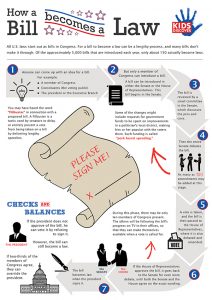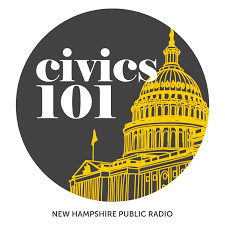As the calendar flips from 2021 to 2022 a new batch of laws, at both the state and federal level go into effect. Oregon, like many states, holds the regular effective date of a newly passed law to be January 1st of the year following the passage of the measure. This isn’t the case for all laws, as some may contain a provision, such as an emergency clause, to enact a law sooner, but generally the ringing in of a new year coincides with the enactment of new laws.
At the federal level, Article 1, Section 7 of the Constitution creates certain rules Congress must abide by as they fulfill their legislative duty and create law. One such rule, the Origination Clause which can be found in the first clause, requires a bill that would raise revenue to originate in the House of Representatives. Another rule, the Presentment Clause, is where we find the requirement that all laws are presented to the President for their signature or veto. There is even another rule, the Presentment of Resolutions Clause, that prevents Congress from noncompliance with the Presentment Clause. The history and motivations behind these rules are complex, but ultimately they were set in place to ensure a process that generates deliberation and deep consideration over any new legislation.
One of the major pieces of federal legislation that became effective on the first of January after its passage in 2021 was the No Surprises Act (NSA). The NSA establishes federal protections against surprise medical bills. The new law was enacted to protect consumers from surprise medical bills in a number of ways. One such way is that the NSA requires private health plans to cover certain inadvertent out-of-network claims, such as those accrued during hospitalizations and apply in-network cost sharing. Additionally, the NSA establishes a process for determining the payment amount for surprise, out-of-network medical bills, which may include various levels of negotiations and an independent dispute resolution process.
Some of Oregon’s laws that went into effect on January 1st also address the medical industry. This includes a new law addressing organ donation education and a new law that allows registered nurses to discuss the use of medical marijuana with their patients as part of a treatment plan. In addition to medically-centered legislation, other issues are covered with these new laws. A number of laws concern voting and the democratic process. For example, a new law will address election misinformation, in the hopes of deterring those who spread false information about the day, times, and processes around voting in general and special elections. Another law requires public government bodies to make their meetings accessible remotely, so that the public can participate, even if they cannot attend in-person. Police conduct, discrimination, criminal justice issues and human composting are just some of the issues covered by these new laws as well.
This week’s Current Events resources explore some of the new laws going into effect in 2022 and how a bill starts as an idea and proceeds to become a statute. The resources shared provide background into the legislative process and insight into a number of laws now in effect both within Oregon and the United States.
Looking for more current events resources? Sign up at our We the Teachers Educator Resource Community page, where you can find all of our Current Events, and learn about our other programs!
Essential Questions, Vocabulary & Extend the Resources:
- What was the process followed for the newly enacted Oregon laws?
- What part of the process to pass a bill into law, do you think would be the most difficult? Explain.
- How have the Oregon government responded to the needs and issues of Oregonians in the 2021 legislative session?
- What laws passed by the federal government in 2021 are now in effect in 2022?
- In your opinion, which newly enacted 2022 Oregon law will have the most impact? Explain.
- What legislative trends can you identify in the newly enacted 2022 laws? (think locally, throughout each state, and the federal government)
Click here for a hardcopy of the Essential Questions & 2022’s New Laws Vocabulary
Click here for a hardcopy of the Extend the Resources handout with suggested lesson activities and extensions
Videos:
Podcasts:
New Oregon laws going into effect in January, Think Out Loud, OPB, January 1, 2022
How a Bill (really) Becomes a Law, Civics 101
How a Bill Becomes a Law… These Days, On The Media, March 26, 2010
There Ought to be a Law!, Civics 101
Background Resources:
How Ideas Become Law, Oregon State Legislature
How an Idea Becomes a Law, OHSU, Government Relations
New laws in 2022 address surprise medical bills, chained pets, cocktails-to-go, NBC News, December 31, 2021
From hate crimes to cold medicine, many new Oregon laws take effect Jan. 1, KGW, December 30, 2021
Recent Articles:
Notable New Laws Coming Into Effect in 2022, Newsweek, January 1, 2022
20 new Oregon laws going into effect in 2022, KOIN, January 1, 2022
Oregon’s new CROWN Act explicitly prohibits raced-based hair discrimination, Statesman Journal, January 1, 2022
New laws take effect across the US in 2022 on abortion, policing, taxes, wages, and more, Business Insider, December 31, 2021
New Oregon laws that go into effect, Lake County Examiner, January 3, 2022
Law to expand affordable housing in Oregon takes effect in 2022, OPB, December 29, 2021
Remember ‘I’m Just a Bill’? Here’s the 2021 version., Politico, September 30, 2021
Images & Infographics:

Elementary Lesson Plans & Resources:
The Perfect Pizza, Washington State Legislature Civic Education Program
How bills become laws, Newsela
How Laws are Made, Kids in the House
Civic Literacy: How a Bill Becomes a Law, The Jimmy Carter Presidential Library and Museum
Lesson Plans:
Lesson Plan: How A Bill Becomes A Law, CSPAN Classroom
How a Bill Becomes a Law Activity for Grades 8-12, Civics Renewal Network
How a Bill Becomes a Federal Law, Annenberg Classroom
How a Bill Becomes a Law, Utah Education Network
How a Bill Becomes a Law, Democracy & Me
Teaching the Legislative Process with Primary Sources Using Congress.gov, Teaching with the Library of Congress
Media & News Literacy Lesson Plans:
Media Literacy Resources – Newseum
News & Media Literacy Lessons – Common Sense
Media Misinformation, Viral Deception, and “Fake News” – University of Wyoming
Evaluating Sources in a ‘Post-Truth’ World: Ideas for Teaching and Learning About Fake News – New York Times Lessons



